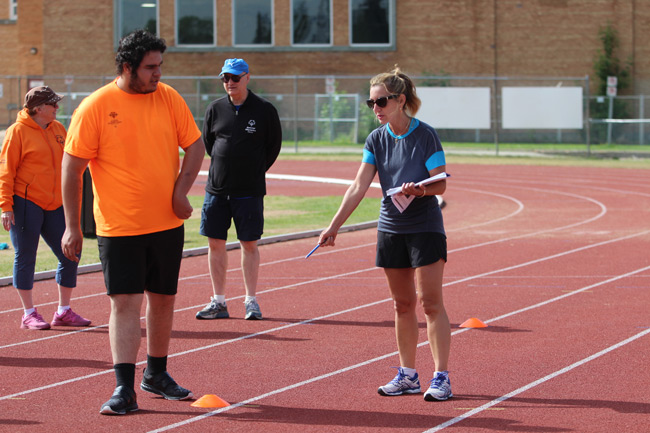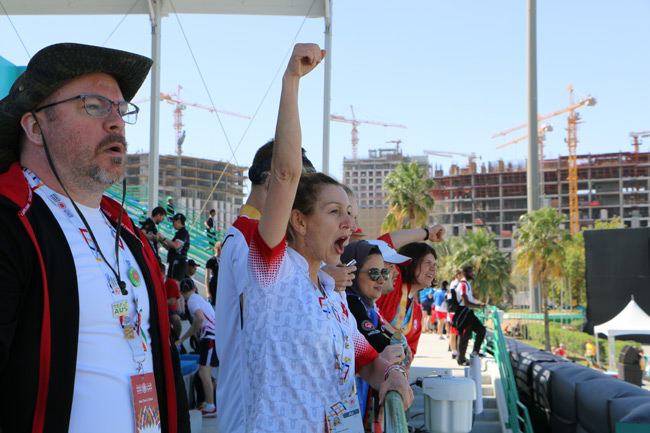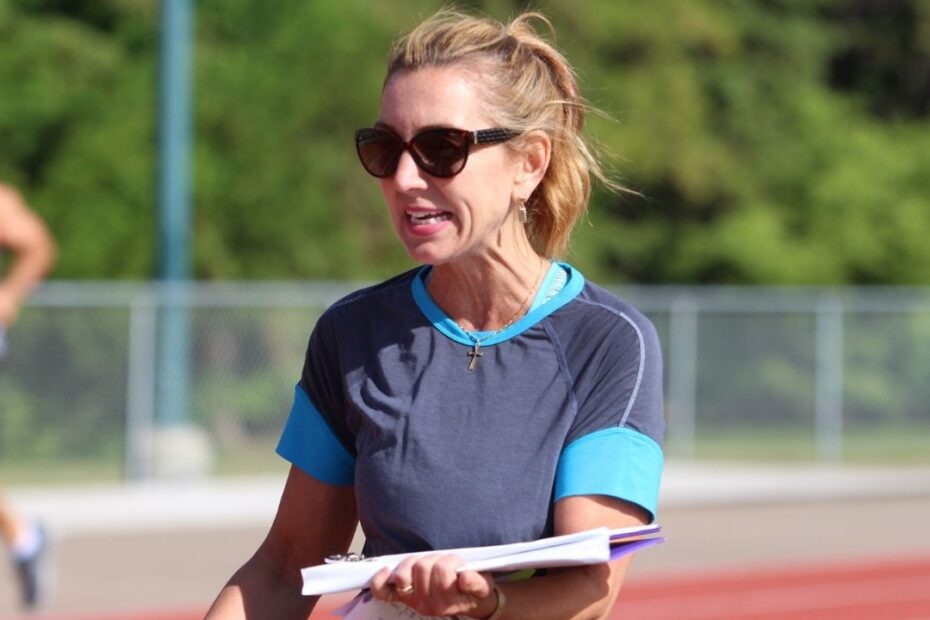Photos courtesy of Special Olympics Alberta.
The first step is easy enough to pinpoint.
A University of Calgary student, Marie Powell is required to round out her zoology degree with a volunteering commitment.
Attending a volunteer fair, she doesn’t get past the Special Olympics booth, where the “nice lady” in charge of recruitment charms her with some “lovely conversation.”
Powell is intrigued. “And, before I knew it, I had signed up.”
That was 30 years ago. Telling the story, there is no hint of regret. For her, rather, it’s a chain of events that feels fated. And by now it’s obvious that the bond between Special Olympics and Powell is mutually beneficial. Purely win-win.
“I get so much out of it,” she said. “It has changed me and improved me as an individual. I have a life with purpose — that’s the biggest thing I get out of it. I know that I am meant to do this.”
Which is something she had realized immediately.
Her introduction to Special Olympics was a Wednesday night track and field practice at a school in Hillhurst, a community in northwest Calgary. Powell remembers vividly, because of the athletes, who were “so happy and so transparent and so genuine,” because of the warm welcome that she, as a newcomer, received from everyone on the premises.
“We were doing gross motor training,” she recalled. “We had activities that were a lot of fun. That hour went by … it felt like 10 minutes. I couldn’t wait to come back because of the good feeling it left me with. I felt I had contributed, but I felt I had gotten so much more back. It energized me.
“I knew that was the right choice because I had so much fun. I felt that it was a great fit.”
Powell’s initial burst of volunteering for Special Olympics lasted four years. She pulled out to raise a family. Then, 11 years ago, she returned to the program.
Consider her immersion in the local scene to be full. Brimming with investment, innovation, inspiration.
“I came back to it, knowing that I wanted to continue my journey,” said Powell. “I always knew there would be a journey with Special Olympics.”
In Calgary, she is the head coach of snowshoeing and the head coach of athletics for novice development.
For Alberta, she’s one of the coaches for the Provincial Exercise and Activity Knockout (PEAK) program and the lead of the Elevate with Exercise initiative.
For Team Canada, she’s the associate coach for snowshoeing.
“I have a few hats that I wear,” Powell said with a chuckle.
Which has not gone unnoticed.
Twice, Powell has been named the Special Olympics coach of the year for the Calgary zone, which features nearly 300 volunteers and more than 700 athletes. She recently received the prestigious Award of Excellence from Special Olympics Alberta.
And — checking in virtually to the 2021 Special Olympics Canada awards announcements Dec. 2 — she discovered that she’d earned the national nod for coach of the year.
“It’s been a great year and a great journey,” said Powell. “I feel humbled. It was a bit overwhelming. Only because I know that there are so many people, including mentors that I have, who put so much into our organization. So to be considered in the ranks of those who I admire, it’s just the biggest honour for me.
“It just fuels me to do a better job, to be continually progressive. It’s just been a huge gift.”

For Powell, commitment is undeniable.
In addition to holding down a day job, she devotes three or four hours every night to the Special Olympics cause and, additionally, up to 16 hours on weekends.
Outlining that mountain of time, then realizing how it might sound, she laughs. “I don’t want to scare away people who are looking to volunteer.”
Powell points out that someone interested in trying on a role with Special Olympics can commit to only a couple of hours per week. But she adds a warning — the draw is powerful.
“The energy and the reward that it gives lasts the entire week until you come back,” she said. “If anybody is ever thinking about it, I would totally recommend it. Everybody fits in — that’s the lovely part. Everybody’s differences are valued. Everybody has something to add.”
Powell, though, always seems to have a little extra to contribute.
A proponent of the PEAK initiative — which, through goal-setting and -reaching, encourages athletes to build points through healthy endeavours — she shared a training regimen that she designed.
“I thought it would make sense if we could build a program that actually had a sequence of development,” explained Powell. “So our athletes could consistently work on things progressively and we, as coaches, could see the outcome.”
Her template promoted weekly challenges and training blocks — with concentrations on endurance, strength, flexibility and balance — which could be further customized by athletes and facilitators.
All of this is tackled remotely, via Facebook. “Home to home,” said Powell, “so that we could still work out with them.”
Also, a year ago in the midst of the COVID-19 pandemic, Powell created a virtual snowshoeing program. Connecting through Zoom calls, coaches monitored their athletes in real time.
The initiative was so successful that the Calgary branch applied Powell’s plan to other winter sports such as figure skating, cross-country skiing, speed skating.
“It was wonderful,” she said. “It was a great program.”
In addition to innovation, Powell appears to have the gift of recruitment.
When, after a 15-year hiatus, she returned to the Special Olympics fold in 2010, she brought along her teenaged daughter Christina. Together, they coached soccer for two years.
To this day, Christina is involved with Special Olympics. “She has done some wonderful things,” said Mom.
As for Powell’s husband Don, he operates as a snowshoeing coach.
“I love that it’s something that our family enjoys doing,” she said. “We do it together. Every Sunday we have snowshoeing — so that’s a family thing that we do — and I love that.”

Powell never considered herself an athlete.
But one day in Grade 8 the physical-education teacher at Vincent Massey School took note of her stamina.
“She encouraged me to try out for the track team,” Powell said. “I knew I was a runner after that. I love to run.”
But competing was only a small piece of the newfound passion. And even though she’s entered — and completed — 10-kilometre races and half-marathons over the years, that is not the goal. Instead, she considers running to be a perfect stress reliever.
Powell’s routine has evolved. Prior to the pandemic, she had been tugging on her sneakers five or six times per week. But she’s used the lockdown months to focus on strength-training.
“I’ve really enjoyed that. It’s given me a whole other way to further develop myself physically,” said Powell. “Now I’m ready to use the strength that I’ve gained to get back to running to see what that looks and feels like.
“I’ll definitely be the runner I used to be, but it was a nice pause … a chance to do something I wouldn’t have considered otherwise.”
Even if she’s open-minded about her training regimens, but her devotion to Special Olympics remains as hearty as ever.
In-person practices resumed last month (for double-vaccinated participants), which thrills Powell, who knows how much the regular get-togethers mean to the athletes.
“They get social, physical, mental development,” she said. “They get a sense of belonging — it’s the only belonging that some of them have. They get a chance to fulfill their dreams. They get a chance to do goal-setting and see that their work delivers their goals.
“They learn skills that they can apply outside of our sport, which I love the most. The social connections they make, the interactions they learn to make, they can apply those to their family, to their friends, to jobs that they have. It’s wonderful.”
Meanwhile, Powell and other volunteers pull plenty out of Special Olympics, too.
As coach, she’s ventured provincially (Grande Prairie, Edmonton); nationally (Corner Brook, N.L., and Antigonish, N.S.); internationally (Abu Dhabi, United Arab Emirates, for the 2019 Special Olympics World Summer Games).
“It’s been amazing, the travel.”
But for the Calgarian, the motivation is not sightseeing. Dividends are much more personal than that. Just ask her.
She sees what Special Olympics does for athletes, what it does for the community. “I love that I play a role in that and I get to see those rewards … in a way that doesn’t even feel like work.”
Powell merrily continues her rave review. All of the research — “the learning, the constant development” — she helps to keep her mentally sharp, “which is really important.”
And now, given the breadth of her knowledge, she is able to mentor newcomers and enhance the experience of other coaches. “I can see the passion within them and I can help them flourish and grow.”
It’s no surprise to hear that, given similar interests and expectations, some of her closest relationships have emerged from the organization’s network of volunteers and athletes.
“I’ve made my best friendships … that I just cherish,” said Powell. “When I go for walks, it’s walks with my fellow coaches. We talk about what we’ve learned. We talk about our lives. We care about each other’s families. It’s just amazing.”
She could go on, no doubt, but the conversation is nearing its end.
Because, even though it’s the weekend, this is a busy day, featuring, for starters, Zoom calls with Team Canada. But before throwing herself back into the volunteer tasks she relishes, Powell neatly sums up her productive association with Special Olympics.
“It’s just so rewarding. It’s endless.”
